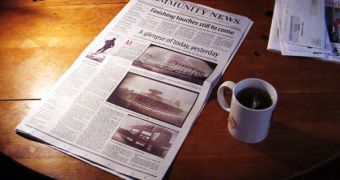News Corp. has now released the first subscriber numbers for its two major British newspapers it has put behind a paywall online. The Times and The Sunday Times of London managed to convince 105,000 people to pay for their content at one during the three months the paywall has been instituted.
While the media corporation says the numbers are encouraging, they represent a huge drop in traffic to the newspapers' websites, which was anticipated by the company.
Of the 105,000 people who have paid for access, only about half are regular subscribers, while the others may have paid irregularly, or just for an individual piece of content.
The 105,000 subscribers include people who paid for the iPad application. A further 100,000 have been granted access behind the paywall since they already have a subscription to the print versions.
“We are very pleased by the response to our new digital services. These figures very clearly show that large numbers of people are willing to pay for quality journalism in digital formats," Rebekah Brooks, Chief Executive of News International, News Corp.'s British arm, said.
"It is early days but renewal rates are encouraging and each of our digital subscribers is more engaged and more valuable to us than very many unique users of the previous model,” she added.
The two newspapers are now only available to paying readers. The homepage is accessible to everyone, but everything else is locked away.
Visitors to the websites can pay £1 for one-day access and £2 for a whole week. This comes to £8.67 per month. iPad users shell out £9.99 per month while Kindle users pay $22.99 per month.
The Times got about 21 million unique visitors before the paywall. This had dropped to 2.7 million for The Times and The Sunday Times of London combined.
News Corp. didn't say how many of the subscribers were iPad users, so a revenue figure can only be roughly estimated. Of course, the big question is whether revenue from the subscriptions is enough to offset the loss from advertising.

 14 DAY TRIAL //
14 DAY TRIAL //